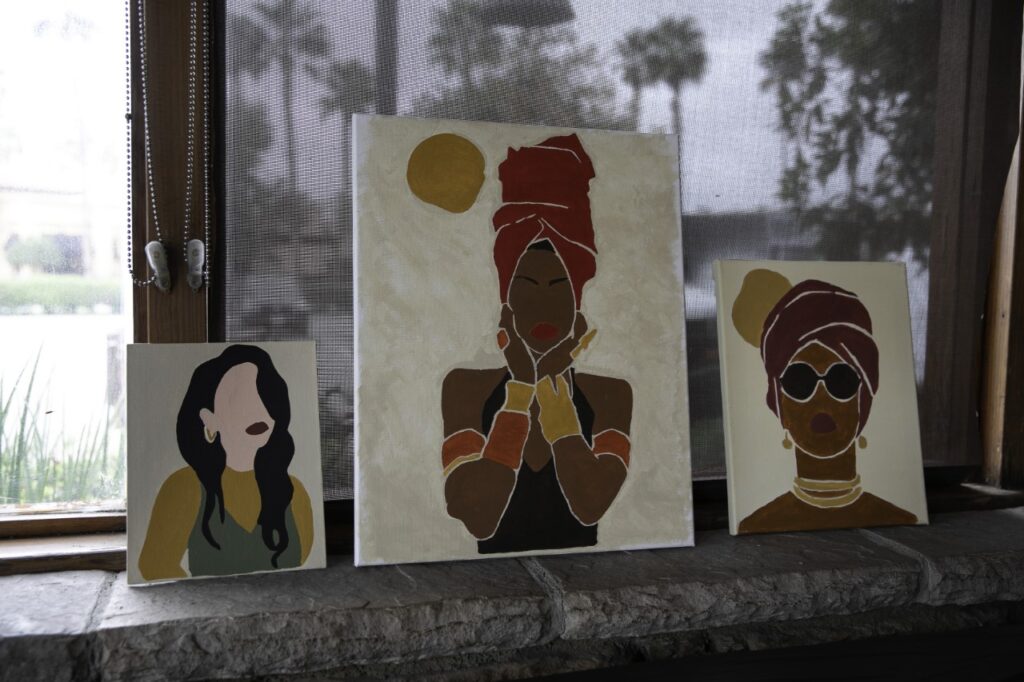
Nicole L. Arkadie & Monique J. Williams
Painting in art therapy is a mindfulness activity that fosters relaxation, increases self-awareness, and can create a positive shared experience between participant and therapist. The Relational-Cultural Theory framework guided this mixed methods study. Using the Mental Health Continuum Short Form (MHC-SF) and a brief demographic questionnaire, the study examined the mental health levels of 24 African American mothers (N=24) who attended a
Moms Empowerment Workshop in a community-based setting two years after the COVID-19 global pandemic was declared over. This study explored how eight mothers (N=8) who participated in structured interviews after the workshop, described their experiences of the workshop and mindfulness painting activity. It was hypothesized that doing a mindfulness painting activity facilitated by an African American Mental Health Art Therapist in a community-based setting would be received positively by the participants. The results indicated that the majority of the mothers exhibited positive mental health and having an
African American Mental Health Art Therapist facilitate the intervention in a community-based setting fostered belonging, psychological safety, and strengthened their connections with one another.
During 2020, the COVID-19 pandemic—an international outbreak of the coronavirus infectious disease that caused severe acute respiratory issues (World Health Organization [WHO], n.d.)—
spread rapidly across the globe, resulting in widespread fear, uncertainty, and social isolation.
During this period, individuals’ mental health was significantly affected, with social determinants such as gender, occupation, and race/ethnicity exacerbating the negative mental and physical health outcomes associated with COVID-19 (Toll & Norton, 2020). The mental health of African American mothers, who are part of a resilient marginalized community, was severely impacted by increased rates of depression and anxiety (Baggett et al., 2021; Chandler et al., 2021; Obinna, 2021; Otu et al., 2020). The intersection of being an African American woman and mother has disproportionately impacted their experiences of health disparities, barriers, and lack of trust and safety, leading to an increase in adverse health outcomes compared to white women (Brockey, 2023; Giurgescu et al., 2015; Mekawi et al., 2023; Williams et al., 2003; Williams & Cooper, 2019).
According to the Centers for Disease Control
and Prevention [CDC] (2023), a national health
science-based service organization in the United
States, the maternal mortality rate for African
American women in 2021 was 69.9 deaths per
100,000 live births, compared to 26.6 deaths per
100,000 live births for white women. The death
rate for African American mothers was 2.6 times
higher than that of white women. Additionally,
the rates for African American women were significantly higher compared to those for white and
Hispanic women, indicating a pronounced racial
disparity in maternal health outcomes. This further highlights the mental health challenges experienced by African American mothers, which are
exacerbated by racial health disparities and influenced by the trust, comfort, and strength they
draw from the intimate relationships formed in
their own community.
I love what I do and consider it a blessing to have the opportunity to share my message of mental wellness with others. Mental Wellness is important and often, we put off our own needs to focus on the needs of others.
© Copyright 2022 Dr Nicole Arkadie . All rights reserved. Website Developed with 💕 By ZONI Graphics & Website Solutions
